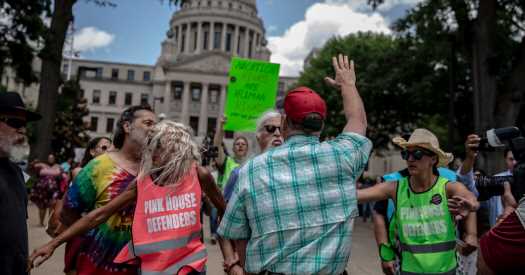The Supreme Court on Monday said it would hear a case from Mississippi challenging Roe v. Wade, the 1973 decision that established a constitutional right to abortion. The case will give the court’s new 6-to-3 conservative majority its first opportunity to weigh in on state laws restricting abortion.
The case, Dobbs v. Jackson Women’s Health Organization, No. 19- 1392, concerns a law enacted by the Republican-dominated Mississippi legislature that banned abortions if “the probable gestational age of the unborn human” was determined to be more than 15 weeks. The statute included narrow exceptions for medical emergencies or “a severe fetal abnormality.”
Lower courts said the law was plainly unconstitutional under Roe, which forbids states from banning abortions before fetal viability — the point at which fetuses can sustain life outside the womb, or around 23 or 24 weeks.
Mississippi’s sole abortion clinic sued, saying the law ran afoul of Roe and Planned Parenthood v. Casey, the 1992 decision that affirmed Roe’s core holding.
Judge Carlton W. Reeves of Federal District Court in Jackson, Miss., blocked the law in 2018, saying the legal issue was straightforward and questioning the state lawmakers’ motives.
“The state chose to pass a law it knew was unconstitutional to endorse a decades-long campaign, fueled by national interest groups, to ask the Supreme Court to overturn Roe v. Wade,” Judge Reeves wrote. “This court follows the commands of the Supreme Court and the dictates of the United States Constitution, rather than the disingenuous calculations of the Mississippi Legislature.”
“With the recent changes in the membership of the Supreme Court, it may be that the state believes divine providence covered the Capitol when it passed this legislation,” wrote Judge Reeves. “Time will tell. If overturning Roe is the state’s desired result, the state will have to seek that relief from a higher court. For now, the United States Supreme Court has spoken.”
A three-judge panel of the United States Court of Appeals for the Fifth Circuit, in New Orleans, affirmed Judge Reeves’s ruling. “In an unbroken line dating to Roe v. Wade, the Supreme Court’s abortion cases have established (and affirmed, and reaffirmed) a woman’s right to choose an abortion before viability,” Judge Patrick E. Higginbotham wrote for majority.
Judge James C. Ho, issued a reluctant concurring opinion expressing misgivings about the Supreme Court’s abortion jurisprudence.
“Nothing in the text or original understanding of the Constitution establishes a right to an abortion,” he wrote. “Rather, what distinguishes abortion from other matters of health care policy in America — and uniquely removes abortion policy from the democratic process established by our Founders — is Supreme Court precedent.”
Lynn Fitch, Mississippi’s attorney general, urged the justices to hear the state’s appeal in order to reconsider their abortion jurisprudence. “‘Viability’ is not an appropriate standard for assessing the constitutionality of a law regulating abortion,” she wrote.
Lawyers for the clinic said the case was straightforward. The law, they wrote, “imposes, by definition, an undue burden.”
“It places a complete and insurmountable obstacle in the path of every person seeking a pre-viability abortion after 15 weeks who does not fall within its limited exceptions,” they wrote. “It is unconstitutional by any measure.”
The court will hear arguments in the case during its next term, which starts in October. A decision is not expected until the spring or summer of 2022.
Source: Read Full Article
